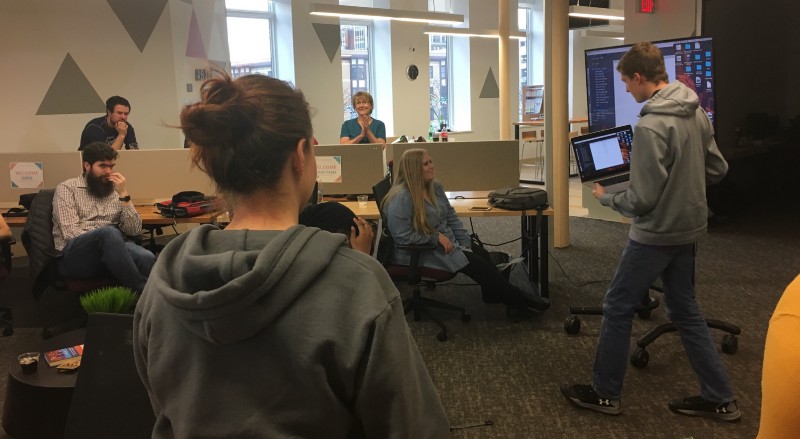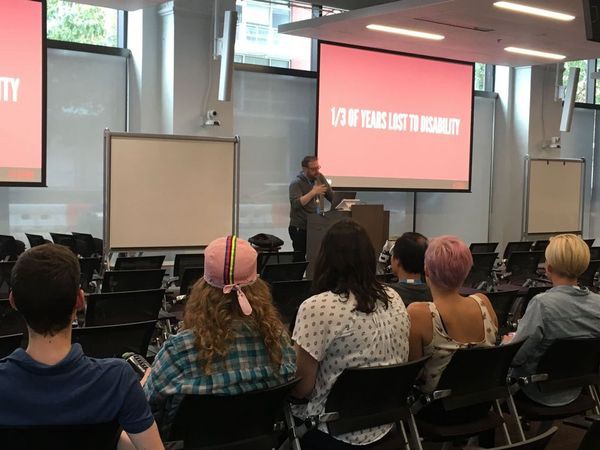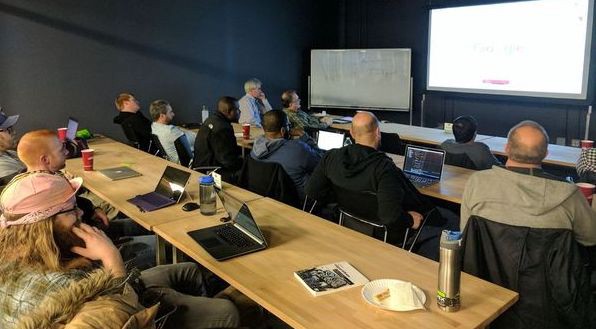I started a local meetup back in 2015 to meet fellow learners and coders. I had no idea at the time that it would help me so much and allow me to meet such amazing people.
I created a group page on Facebook first, replacing an inactive local freeCodeCamp group that had started earlier in the year. Members started to join one at a time and there were about 20 - 30 when I posted the first meeting.
In the beginning
The first few meetings we had were filled with code and coffee. We got together at a local cafe and worked through freeCodeCamp challenges and projects, and talked tech. We had about 4 - 8 members show up at the first few meetups and, within a few months, we started to outgrow the small cafe.
Around that time, I had grown my network in Indianapolis for almost a year and had met several people who were interested in speaking to the local freeCodeCamp members. I reached out to several co-working spaces and a few of them agreed to host us for free. In addition, the company I was working for offered to buy pizza for the group once a month. The only things left to do were schedule the meetings and let the members know.
The Facebook group started growing quickly with new members every week and we decided to start a meetup.com organization to broaden our reach. Many people look for coding groups on the meetup website, so the average number of members in attendance at the meetups more than doubled. Now, we average about 17 - 28 participants.
An experienced local developer, Jared Wilcurt, offered to start helping out with the group and that was a huge reason behind our success. He was very organized, an excellent speaker, and a great teacher too. He’s helped me plan every event we’ve had for almost two years now.
A note about Meetup.com: It costs $90 every six months to host a group on the platform. Some options to cover the fee could be taking donations, finding sponsors, splitting the bill between the organizers (this is what we currently do), or adding your group to someone’s account who already hosts a meetup, since meetup.com allows you to organize three groups with a single paid membership.
Our Best Meetups
Here are the best meetups we’ve had and a summary of what was covered.
Crafting a Developer Résumé
This was a talk given by a senior developer where members were encouraged to bring their résumés to review during the presentation. Résumés are still extremely important for getting hired, and this meetup detailed how tech résumés should be written and cleared up a lot of misconceptions. We had a great, interactive Q&A at the end also.
Tech interview practice
We recruited nine local developers with experience giving technical interviews. Enough members showed up to pair 2 members for every interviewer.

This event included practice answering various types of interview questions as well as a whiteboarding component. It was an awesome thing to hear all the noise from everyone being interviewed at the same time and see the participants walk away with more confidence afterwards. By the end we had received strong positive feedback from both the attendees and the interviewers. We’re looking forward to doing this event again in the future.
Mini Hackathons
Collaboration is such an important skill to master. We’ve been hosting short 6–7 hour hackathons every quarter to help people improve their collaboration skills. These are beginner-friendly events and there are no prerequisites for participating.

For the event, people can either choose whom they work with or randomly be selected for a team. Both ways seem to work just fine. We randomly choose a topic from a list of suggestions at the beginning (for example, games, movies, cats, and so on) and each team (usually 3 - 4 people) builds whatever they want around that topic.
During the first few hackathons we hosted, we spent a lot of time teaching people collaboration techniques and it was hard for people who were mostly new to coding to get up to speed on things like Git very quickly. Fortunately, we found a site called Glitch that allows you to collaborate as a team in the same code editor — it’s also very easy to use.
We started partnering with Girl Develop It to get increased participation in these events. A few local companies also have graciously bought food for participants while they were hacking away.
freeCodeCamp Remote Hackathon
We did a 24-hour hack with members from Gary (near Chicago), Indianapolis, and CA freeCodeCamp groups. There were some experienced and some junior participants, so it allowed a lot of mentoring to happen.
This event went really well but we haven’t made the time to organize a second one. It would be great if we can find an online system to create teams and organize another one in the future.
Mental Health Meetup
Mental health is something that no one really wants to talk about even though it disproportionately affects the tech industry (source).

Ed Finkler from Open Sourcing Mental Illness came and spoke with us about how we can properly help people and open up discussions about these problems in the workplace. As someone who has struggled with anxiety and other issues, it made me very happy to realize I wasn’t the only one.
Some Meetups that didn’t go so well
Intro to Ruby Workshop
We had an amazing instructor come from a local coding bootcamp and we thought everything was prepared and ready to go. Wrong!
We never took into consideration that people would have different coding environments and might have lots of trouble downloading and installing the requirements. All of our other workshops had been JavaScript-focused before this, and we weren’t prepared for the challenges we faced. We ended up pivoting half way through and having the instructor just give a demo of the language.
I still feel bad about that one. In the future, we may have an online environment already set up before the event for participants to use.
Intro to Node and Express (with Mongo)
The title says it all. We were trying to do too many things in a short amount of time. Even though the instructor was knowledgeable, the learners eyes started to glaze over and it seemed like they left more confused than before.
Tips for Running Meetup Groups
Based on my experience, here are a few tips for running successful meetup groups.
- Start a group chat with a room called ‘planning’ to collaborate on meetup ideas and get more people involved (we use Discord since it has a good UI, is free, and we can create lots of rooms for various topics).
- Reach out to local companies and co-working/maker spaces for volunteers, meeting space, food sponsorship.
- Make a spreadsheet to keep track of the events you have hosted, how many people came, and any notes for things to learn from in the future. This is also helpful if you are going to be looking for sponsors.
- Create surveys on topics of interest for future meetups (we use Google surveys for this). It’s nice to post a shortened URL to the survey at the end of every event and encourage people to fill out the survey. Multiple choice questions get a lot more responses than short answers, so we mostly stick with that.
- At every meetup, mention that the group is run by volunteers and that the more people that help out, the more and better events you can have for the members. This is a great way to solicit help.
- When you attend other meetups, ask the organizers if you can mention your local freeCodeCamp group - ask for volunteers, mentors, and new members.
- Group projects can be a valuable learning resource. Collaboration is a vital skill for programmers and it can be super helpful for learners to be able to learn this skill in a supportive environment. We built a local freeCodeCampIndy website as a group and had a lot of fun doing it.
- Food helps ? but if it’s not possible, then make sure to let people know so they can plan to eat before or after the event.
In Conclusion
Running a meetup is both rewarding and time consuming. It’s given me a lot of opportunities and connections in the local community, but I’ve had to learn to balance my time and know when to ask for help. It’s taken a while, but I think we finally have a good system for helping and supporting people while they learn to code.
If I’m missing anything here, let me know in the comments. Thank you.

